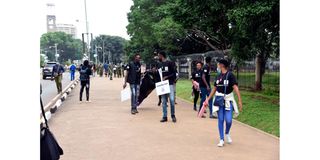Concern as femicide cases surge on campus

University students participate in a procession in Nairobi on June 8, 2021, against increased rape and femicide cases in learning institutions. Femicide cases are on the rise once again.
What you need to know:
- Last week, Adah Nyambura, a first-year student at Maasai Mara University, was found dead in a bush off-campus.
- Last month, Mary Ann Wangari, a 22-year-old student at Bomet University, was sexually assaulted and strangled to death.
Femicide cases in Kenyan universities have increased in recent months. In less than five months, six female students have died at the hands of their alleged boyfriends.
Last week, Adah Nyambura, a first-year student at Maasai Mara University, was found dead in a bush near the main campus. A postmortem conducted at the Narok Level Five Hospital revealed that Ms Nyambura was sexually abused, tortured and strangled.
She was last seen partying in the company of her classmates and boyfriend. Investigations are underway.
Last month, Mary Ann Wangari, a 22-year-old communications and public relations student at Bomet University, was sexually assaulted and strangled to death. Her body was found floating on River Nyangores in the Chebirir area of Bomet County.
In March, June Jerop Kangogo, an accountant at the National Industrial Training Authority (Nita) in Nairobi and an MBA student at Kenyatta University, died from excessive bleeding due to stabbing.
According to police reports, her alleged boyfriend, Jesse Wafula Walukha, an accountant at Nita, is among the suspects arrested in connection with her murder.
Abortion
In February, Regina Wairimu, a 22-year-old fourth-year student pursuing telecommunication and electrical engineering at the Dedan Kimathi University of Technology, died as a result of a suspected forced abortion. One of her diary entries suggested that her boyfriend did not want her to keep the child she was carrying.
In January, detectives from the Directorate of Criminal Investigations (DCI) found the body of Phyllis Jepleting,19, a maths/biology first-year student at Karatina University inside Ezra Kipkemoi’s house on Naka Estate, Nakuru County.
Mr Kemboi, who was the student’s boyfriend, pleaded guilty to killing Ms Jepleting before Justice Theresia Matheka in Nakuru Courts.
In the same month, Victoria Muthoni Theuri, a public policy and administration student at Kenyatta University was found dead in her boyfriend’s house in Kahawa Wendani, Kiambu County. These are just some of the cases highlighted this year in the media.
Last year, Nation.Africa exposed a worrying trend of intimate partner violence in universities. However, no concrete action has been taken by the authorities since the report.
In 2021, university students held a procession in Nairobi in protest against increased femicide and rape cases in the higher learning institutions.
Tony Mwiricha, a teacher who interacts with university students, attributes most crimes of passion to drug abuse and intoxication that leads to poor judgement.
“The clergy, guardians and parents, among other caregivers, must offer intense mentorship in society through programmes that serve to alleviate crimes of passion.
"Lastly, our justice system should be made more water-tight to deal with such vices with no ounce of sympathy for the culprits. That will discourage such incidents from recurring,” Mr Mwiricha says.
Chibeka Matara, a student leader currently serving as the governor of University of Nairobi main campus, says there is still low awareness of what intimate partner violence entails.
“As a student leader, one of the initiatives that I plan to start is awareness creation of gender-based violence within campus. We need to destigmatise these conversations so that students can be aware of them when they're happening,” he said.





